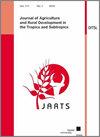危地马拉上维拉帕兹农林业的社会经济、政治和体制可持续性
Q3 Social Sciences
Journal of Agriculture and Rural Development in the Tropics and Subtropics
Pub Date : 2019-11-19
DOI:10.17170/KOBRA-20190613561
引用次数: 4
摘要
促进农林业等可持续农业实践可以提高长期生产力,增强可持续农村生计,减少对热带自然资源和生态系统的压力。然而,由于外部市场力量、技能、财政资源和专有技术的缺乏,农林业的采用似乎存在问题,最终导致农民在实施农林业时灵活性低和不连续性。本研究的目的是确定影响农林业在家庭和社区层面采用的社会、制度和经济因素,并以危地马拉的Alta Verapaz地区为例进行研究。Alta Verapaz是该国最贫穷的地区之一,但也是热带生物多样性热点地区,目前的农业实践正在威胁着森林环境和社会发展目标。我们的研究探讨了资本可及性和制度激励对农民生计可持续性和农资构成的影响。该方法由对19位农民的半结构化访谈和实地观察组成。运用归纳类展开法对访谈内容进行定性分析。根据这些结果,该研究发现,人力和经济资本在有机构的社区受到青睐,特别是通过提供农业培训、建立农民合作社和经济激励措施。结果,各机构在促进有机农业方法、保护森林和创造长期收入方面的作用至关重要。农业多样化与体制激励相结合是农民为实现其家庭的社会经济和生态可持续性而采取的一项关键生计战略。进一步促进社区林业项目、扩大网络和正在进行的农业培训以及农业系统的多样化可能对上维拉帕斯省的农民有益。本文章由计算机程序翻译,如有差异,请以英文原文为准。
Socio-economic, political, and institutional sustainability of agroforestry in Alta Verapaz, Guatemala
Promoting sustainable agricultural practices such as agroforestry (AF) could improve long-term productivity, enhance a sustainable rural livelihood and reduce pressure on natural resources and ecosystems in the tropics. However, AF seems to have adoption problems due to external market forces, lack of skills, financial resources and know-how ending in low flexibility and discontinuity of farmers in practicing AF. The objective of this study is to identify social, institutional, and economic factors that influence the adoption of AF on the household and community level, taking the region Alta Verapaz in Guatemala as a case study. Alta Verapaz is amongst the poorest regions in the country but also a tropical biodiversity hotspot where current agricultural practices are threatening forest environments and social development objectives. Our study explores how capital accessibility and institutional incentives are related to farmer’s livelihood sustainability and AF compositions. The methodology is composed by semi-structured interviews with nineteen farmers and field observations. The interviews have been analysed based on a qualitative content analysis by using the inductive category development. Based on these outcomes, the study found that human and economical capitals are favoured in communities were institutions are present especially through AF training offers, creation of farmers cooperatives and economic incentives. The role of institutions resulted to be crucial in the promotion of organic AF methods, forest protection and creation of long-term income. The combination of agricultural diversification with institutional incentives is one key livelihood strategy adopted by the farmers in order to achieve a socio-economic and ecological sustainability of their households. The further promotion of community forestry projects, expansion of networks and ongoing agricultural trainings as well as the diversification of agricultural systems could be beneficial for farmers in Alta Verapaz.
求助全文
通过发布文献求助,成功后即可免费获取论文全文。
去求助
来源期刊
CiteScore
2.30
自引率
0.00%
发文量
0
审稿时长
>36 weeks
期刊介绍:
The Journal of Agriculture and Rural Development in the Tropics and Subtropics publishes papers dealing with original research and review papers in the fields of plant production, animal nutrition and animal husbandry, soil science, rural economy and farm management, forestry and forest economy, veterinary hygiene and protection against epidemics.

 求助内容:
求助内容: 应助结果提醒方式:
应助结果提醒方式:


